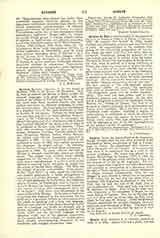

Alvarez, MANOEL, educator, b. on the island of Madeira, 1526; d. at Evora, December 30, 1582. In 1546 he entered the Society of Jesus, taught the classical languages with great success, and was rector of the colleges of Coimbra and Evora. Among the more than three hundred Jesuits who have written textbooks on different languages, he takes the foremost place. His Latin grammar was adopted as a standard work by the Ratio Studiorum, or Plan of Studies, of the Jesuits. Perhaps no other grammar has been printed in so many editions; Sommervogel, in his “Bibliotheque de la compagnie de Jesus,” devotes twenty-five columns to a list of about four hundred editions of the whole work, or parts of it, published in Europe, Asia, and America. There exist also numerous translations into various languages: Bohemian, Croatian, Flemish, French, German, Hungarian, Illyrian, Italian, Polish, Spanish. An edition with Chinese translation appeared in Shanghai in 1869. A very interesting edition is one published in Japan in 1594, with partial translation into Japanese. An English edition, “An Introduction to the Latin Tongue, or First Book of Grammar”, appeared in 1686. In many editions the text of Alvarez is changed considerably, others are abridgments. The original work contains many valuable suggestions for the teacher. On this account it is more than a mere grammar; it is also a work on the method of teaching Latin, and gives an insight into the system of the old Jesuit colleges. The book was the subject of several controversies. Even Jesuits, in the “Trial Ratio” of 1586, raised six objections, and desired, particularly, a better arrangement of some parts and greater clearness. After the publication of Latin grammars by De Condren, the Oratorian, and by Lancelot, of Port-Royal, both in French, the work of Alvarez was frequently censured, because it was written in Latin, and “presupposed what was to be learnt”. Still, there were advantages in the course followed by Alvarez. To be sure, to beginners everything was explained in the vernacular; but the early use of a grammar written in Latin accustomed the pupils to speaking and writing that language. Without some practice of this kind a thorough knowledge of a language can hardly be obtained, and in former centuries a facility in speaking and writing Latin, which was the universal language of the educated world, was of the greatest importance. At the present day Jesuit colleges use modern grammars, thereby accommodating themselves to new conditions and changed educational ideas.
ROBERT SCHWICKERATH

